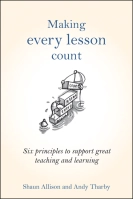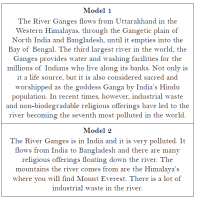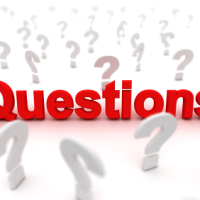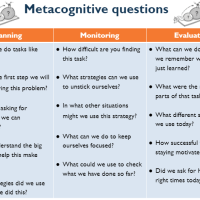Tonight’s 15 minute forum was led by PE teacher James Crane. James started the session with a quote (source unknown) that he suggests would be familiar to most teachers – at some point in our career:
So, it’s worth thinking about the purpose of questioning:
- to interest, engage and challenge pupils. This is why teaching is such a complex task – we may have up to 30 students in our class, all with different prior knowledge and motivation – but we need to think of suitable questions that will keep all of them in the struggle zone;
- to check on prior knowledge;
- to stimulate recall and use of existing knowledge and experience in order to create new understanding and meaning;
- to focus thinking on key concepts and issues;
- to extend pupils’ thinking from the concrete and factual to the analytical and evaluative;
- to lead pupils through a planned sequence which progressively establishes key understanding;
- to promote reasoning, problem solving, evaluation and the formulation of hypotheses;
- to promote pupils’ thinking about the way they have learned.
 So, within our framework of six pedagogical principles, questioning is a key way of providing challenge – once we know the students we teach and their starting points, we can direct our questioning at specific individuals, to really move their thinking on. Likewise, asking good questions provides us with feedback about how well students are understanding the work – which should then inform our planning.
So, within our framework of six pedagogical principles, questioning is a key way of providing challenge – once we know the students we teach and their starting points, we can direct our questioning at specific individuals, to really move their thinking on. Likewise, asking good questions provides us with feedback about how well students are understanding the work – which should then inform our planning.
Barriers & problems with questioning
- Our wait time for students to respond to a question is often too short (0.9 seconds). This doesn’t really give students enough time to really think about a response.
- Our own subject knowledge needs to be strong, if we are going to respond to the multitude of responses that students can give.
- it can sometimes only involve a few students – the ones that we know are going to give a good answer.
- Accepting poor answers due to time pressures.
- Teacher talk is good – but it needs to be productive teacher talk – which is usually punctuated with questioning.
- Ineffective questions that provide very little challenge.
- Getting the answers wrong – make sure you know your stuff! If not, you run the risk of embedding misconceptions.
- Unexpected responses – this can and will throw new teachers! So thinking about possible responses and you might respond is important (but not easy!)
- “Ping-pong” between the teacher and one student – will get quite tedious for the rest of the class – so bring other students in e.g. “So what do you think about John’s response?“
Effective questioning should…..
- Involve a wide range of students.
- Deepen and develop thinking.
- Address misconceptions.
- Embrace struggle – make it OK to get things wrong, as long as they think about why and persevere to get it right.
- Allow you to target students who are not performing well, by making them think – and boosting their confidence.
- Ensure responses are developed by more complex questions
- Should provide a scaffold for reluctant respondents
- Allow students to experience success (even with scaffolding) and so build their confidence and motivation.
- Evaluate peer responses – “What did you think about that answer?”
- Encourage students to ask questions.
- Ensure that Standard English is used for all answers.
- Support metacognition – getting students to think about their own thought processes e.g. “Why did you answer that question in that way?”
Some ways in which you can make questioning that little bit better…
- Atmosphere is VITAL – Know your students. Once you know your students, you can make sure you are asking them the right questions, to keep them in the struggle zone.
- When students respond to a question, ask their peers to ‘Agree with, Build upon or Challenge their response (ABC feedback). More on this here from Alex Quigley
- Incorrect answers can be addressed by other students, through you directing questions their way.
- Allow them thinking time – so ask a question, pause for thinking time and then ask for responses. A development of this is ‘think, pair, share’ – think about the answer on your own, discuss it with a partner and then be prepared to share it with the class.
- Cold calling – a simple but highly effective strategy from Doug Lemov. Ask a question, pause, then direct a the question at a student by using their name. This ensures all students have to pay attention to the question.
- Good questioning is a key part or responsive differentiation, as discussed here by Andy Tharby.
- Hinge questions – these are really important. In your planning, think of the key questions that students should be able to answer, before you move on in the lesson. more on this from Harry Fletcher-Wood here.
- Plan a ‘Think hard’ question for every lesson to encourage deep thinking.
- When a student replies with ‘I don’t know’ – don’t let them off the hook. Tell them you’ll come back to them in 5 minutes.
- Use a stimulus e.g. a photo, piece of writing etc to get students to ask questions, at the beginning of the topic.
- Plenary prefect – at the start of the lesson, students are identified and told that they will need to think of three good questions to ask at the end. More on this here. Take care here – check the questions before they ask them, to make sure they are addressing the things you want them to.
- Pose, pause, pounce, bounce.
- Let a student know a question is coming. This allows them thinking time – so either say to a whole class (or even an individual) – ‘Right, in 10 minutes I’ll be asking you…..’
- Inquisitive question – during a lesson, stop the students (at a convenient point!) and ask them to think about and share some questions about what they have done so far.
- Use ‘WHAT HOW WHY?’ in response to student responses – to promote more elaborate thinking.
- Link your questions to the assessment criteria – so you are getting them to think about the right things.














Reblogged this on David J Terrell and commented:
We learn through questioning! I think the most effective teaching is based on inquiry so this article is a must read as it exposes the need for effective questioning! In college chemistry, a methodology has been developed called Process Oriented Guided Inquiry (POGIL) in which (supervised by the professor) students lead the inquiry.
Pingback: #Fridaylinkpack2 | robfmac